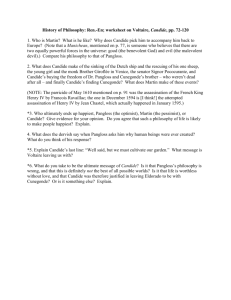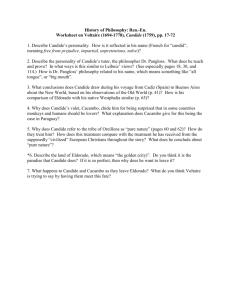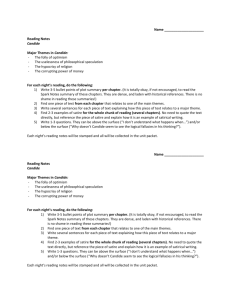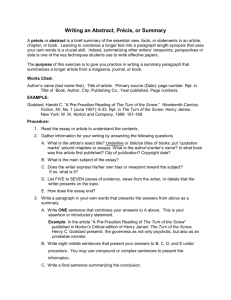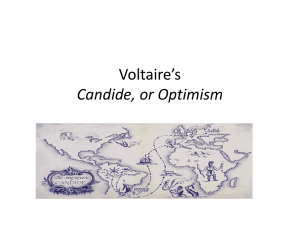Candide
advertisement
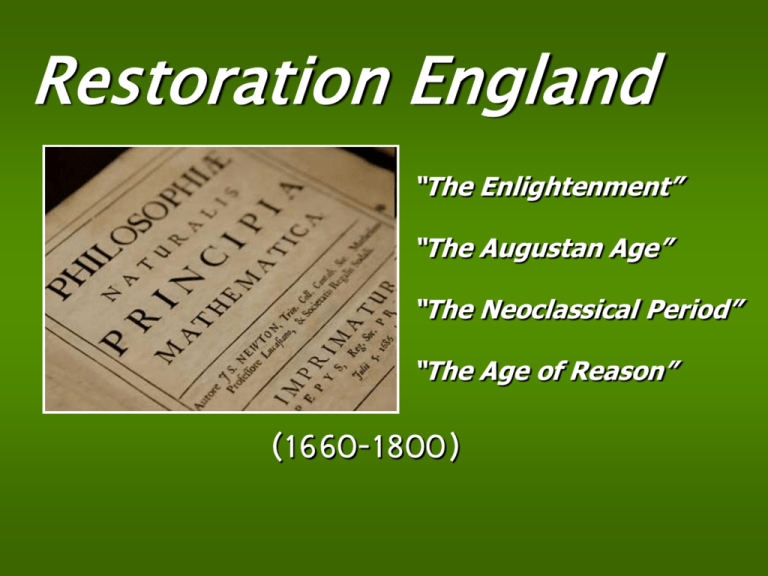
Restoration England “The Enlightenment” “The Augustan Age” “The Neoclassical Period” “The Age of Reason” (1660-1800) Brought out of Civil War • After ten years and multiple Civil Wars (1641-1651), Charles II united England, Scotland, and Ireland. • Theater reappeared and censorship of the arts vanished. • Religious persecution Changes and Titles • In this time period England went through a plague, a massive fire across London, colonialism, the creation and loss of the American colonies, and a growing middle class. • “The Augustan Age” – like Emperor Augustus of Rome, the Stuart kings brought peace to their country tired from warfare. Tired of revolutionaries and fighting, thus elevating a monarch to a savior – Oliver Cromwell • “The Neoclassical Period” – emphasis on Latin classics and emulating Latin works to bring around a “new classical” period. Titles Cont. • “The Age of Reason” and “The Enlightenment” – asking “how” instead of “why.” More science and less superstition. Enlightened progress and attitudes: • The Scientific Method • Astronomy • Hooke and Newton • Philosophy Rationalism – reason is the only proper basis for decisions Materialism – everything is a state of matter Deism – the “clockmaker” view of religion The Bloodless Revolution • Charles II died heirless. His brother James II, a Roman Catholic, took the throne. • When James had a son, a Catholic heir, the English political leaders transferred power to his daughter Mary II. • Her husband, the Dutch king William III, attacked England for power in the Glorious (Bloodless) revolution. He and Mary jointly ruled. • Factions divided over Catholic James and Protestant William can still be found today in Northern Ireland. Theater • After the ban on theaters during Puritan rule, major changes took place since Shakespeare’s time: • • • • • Royal patronage for acting companies Women playing female roles Unsentimental, unromantic Witty comedies Plays for the pampered class and for the ordinary man Changes in Literature • Satire: Authors like Pope and Swift wrote to the privileged class and criticized their lifestyles, using wit as a means of venting over materialism and corruption. They did not share the common attitude of the time – smugness and satisfaction • Journalism: As Pope spoke to the wealthy, journalism spoke to the middle-class. Not only commenting on society, also attempting to reform it. • Poetry: Poetry was not about conveying the soul, it was a public tool. Elegies and odes served a specific function in society. Poetry as a matter of precision and wit and nothing else. • Novels: The development of the true English novel came from this period. Women became a large reading market. Most novels were adventurous with numerous spirited “episodes” – such as in Robinson Crusoe and Tom Jones. Alexander Pope • (1688-1744) • He “lisped in numbers” as a child • Denied education, deformed, but the greatest poet of his age • Early success in essays and epic poetry • Satire used for revenge Jonathan Swift • Born in Ireland in 1667 – Death 1745 • Suffered from Ménière's disease • MA from Oxford in 1692 • Became an Anglican priest in 1695 • He was active in the early debates of the political parties in England— Whigs and Tories • Swift is most famous for his satires, He wanted to make people think by using humor. Swift has sailed into his rest. Savage indignation there cannot lacerate his breast. Imitate him if you dare, world-besotted traveler. He served human liberty. -Yeats’ translation of Swift’s epitaph Gulliver’s Travels and Satire *Gulliver’s Travels is a parody of the genre of “travel narrative” *During the sixteenth, seventeenth and eighteenth centuries, these tales of voyages of exploration and colonial adventure were extremely popular: Christopher Columbus Amerigo Vespucci Sir Walter Raleigh Captain John Smith *More’s Utopia also parodies the genre, Shakespeare’s The Tempest invokes the genre, and Candide serves as Gulliver’s French brother *Travel narratives are often sometimes “utopian”—Book IV of Gulliver’s Travels also parodies More’s Utopia Gulliver’s Travels and Satire Lemuel Gulliver’s four voyages can be seen as a criticism of key European issues. But just as importantly, it serves as a satirical exploration of the human condition: What does it mean to be a human being? The name “Gulliver” suggests that he is “gullible” Gulliver’s first voyage, to Lilliput: The diminutive citizens of Lilliput represent human small-mindedness and petty ambitions. Filled with selfimportance, the Lilliputians are cruel, treacherous, malicious, & destructive. Voltaire • (1694-1778) • Real name was François-Marie Arouet • • • • • (used at least 178 pen names) Wrote poetry, polemic fiction, essays, plays, histories, and over 20,000 letters. Imprisoned and exiled many times for his attacks on the government, the aristocracy, and the Catholic Church. While exiled to England, Voltaire was impressed by England’s constitutional monarchy and freedom of speech. He returned to France, spoke out, and was exiled again. Along with Emilie du Chatelet, studied all the great advances of the Enlightenment. A freemason buddy of Ben Franklin Place these locations in order based on when Candide arrives at them. (You can all work as a group) • • • • • • • • • • • • Paris Constantinople Lisbon Bulgaria Buenos Aires Germany Holland Paraguay Venice El Dorado Home of the Biglugs Surinam Candide sequence of events Germany Bulgaria Holland Candide is caught kissing & gets kicked out by the Baron Recruited into the Bulgarian army, Candide runs away Saved from hunger by Jacques. Pangloss appears. Lisbon, Portugal Buenos Aires Paraguay Gov. Don Fernando proposes to Cunegonde. Candide flees the authorities. Jesuit colonel and Cunegonde’s bro killed by Candide, Escape again Shipwreck, earthquake, Pangloss hung, Cunegonde found, escape! Candide sequence of events Home of the Biglugs El Dorado Surinam Candide and Cacombo captured, then celebrated for killing a Jesuit Find a utopia, leave with riches intending to buy back Cunegonde Cacombo leaves, sheep stolen by captain, Candide books passage to France, meets Martin. Paris Venice Constantinople Candide sick and swindled of his riches many times, framed by Abbe, flees to England. Paquette’s story, meeting the pleasure-less count, & the dethroned kings, Old friends saved from servitude, Cunegonde ugly and wed, the dervish, “garden cultivating” Essay Topics • 1) Voltaire subtly attacks the theory of progress. What is that theory, and do we still believe in it? Is it a good belief? Use evidence from Candide to show Voltaire’s attitude towards the concept. • 2) To what extent does an optimistic outlook improve or impair society? To what extent does a pessimistic outlook improve or impair society? (MUST reference Candide and have a good grasp of history) • 3) Voltaire was a deist. In a comparison/contrast essay, explain how we see Voltaire’s deism in Candide and how it differs from the traditional Catholic/Protestant views depicted in the novel. How does Voltaire use his belief and satire to criticize the Church? • 4) Martin claims that people “live either in convulsions of misery or in the lethargy of boredom.” Do the events of the novel support that statement? Is one of the two options worse than the other? If what Martin says is true, what does it imply about the value of social change and political activism?
